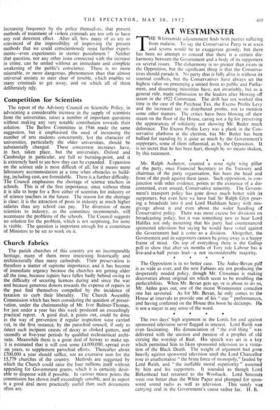AT WESTMINSTER
THE Whitsuntide adjournment finds both parties suffering from malaise. To say the Conservative Party is at sixes and sevens would be to exaggerate grossly, but there has been no attempt to conceal that there is a certain dis- harmony between the Government and a body of its supporters on several issues. The disharmony is no greater than exists in the Opposition, but the significant thing is that the Conserva- tives should parade it. No party that is fully alive is without its internal conflicts, but the Conservatives have always set the highest value on presenting a united front to public and Parlia- ment, and dissenting minorities have, not invariably, but as a general rule, made submission to the leaders after blowing off steam in the 1922 Committee. The drill has not worked this time in the case of the Purchase Tax, the Excess Profits Levy and the increased tax on distributed profits, not to mention some other matters. The critics have been blowing off their steam on the floor of the House, caring not a fig for preserving the appearances of solidarity nor showing Mr. Butler much deference. The Excess Profits Levy was a plank in the Con- servative platform at the election, but Mr. Butler has been bullied for standing by it quite as much by the Government's suppcsters, some of them influential, as by the Opposition. It is no secret that he has been hurt, though by no means shaken, by this treatment.
* * .* * Mr. Ralph Assheton, counted a stout right wing pillar of the party, once Financial Secretary to the Treasury and chairman of the party organisation, has been the head and front of the push against these taxes. Such opposition, in con- junction with other evidence, points to the existence of a dis- contented, even soured, Conservative minority. The Govern- ment's transport policy has gone down much better with its supporters; but even here we have hat! Sir Ralph Glyn pour- ing a broadside into it and Lord Hailsham heavy with mis- givings about it and even about the wider handling of Conservative policy. There was more excuse for divisions on broadcasting policy, but it was something new to hear Lord Halifax not only mourning that his party had countenanced sponsored television but saying he would have voted against the Government had it come to a division. Altogether, the Government and its supporters cannot be going away in a happy frame of mind. On top of everything there is the Gallup poll to show that after six months of Tory rule Labour has a five-and-a-half points lead—a not inconsiderable majority.
* * * * The Opposition is in no better case. The Attlee-Bevan gulf is as wide as ever, and the new Fabians are not producing the desperately needed policy, though Mr. Crossman is making discoveries about original sin which seem to be troubling the perfectibilists. When Mr. Bevan gets up. or is about to do so, Mr. Attlee goes out, one of the nicest Westminster comedies one has savoured. As for Mr. Bevan, he only comes to the House at intervals to provide one of his " star " performances, and having conferred on the House this boon he decamps. He is not a stayer in any sense of the word. * * ' The two days' high argument in the Lords for and against -sponsored television never flagged in interest. Lord Reith was even fascinating. His denunciation of " the evil thing " was delivered with the unction and passion of a prophet of old cursing the worship of Baal. His speech was set in a key which permitted him to liken sponsored television to a visita- tion of the Black Death. The weight of argument had gono heavily against sponsored television until the Lord Chancellor rose to anathematise " the brute force of monopoly," lauded by Lord Reith, and " the ineffable moral superiority " assumed by him and his supporters. It sounded as though Lord Birkenhead had returned to the Woolsack. Lord Simonds went one better than the White Paper and plumped for spon- sored sound radio as well as television. This surely was carrying zeal in the Government's cause rather far. H. B.










































 Previous page
Previous page